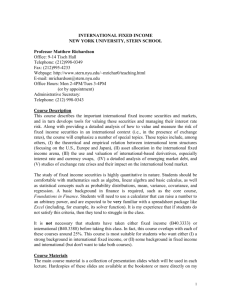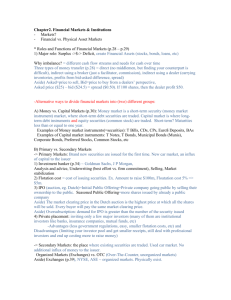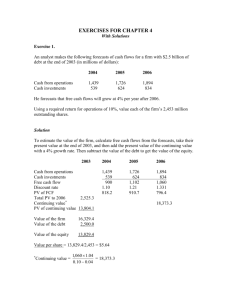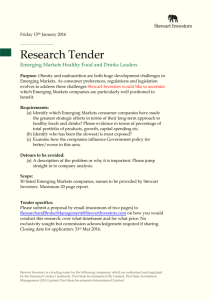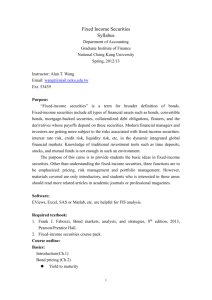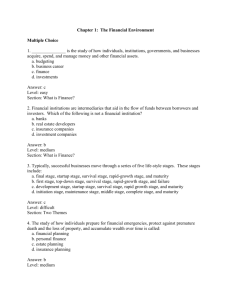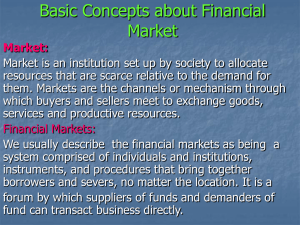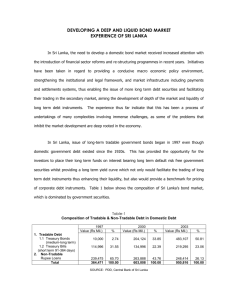Investment Programme “Emerging Markets Bonds“
advertisement
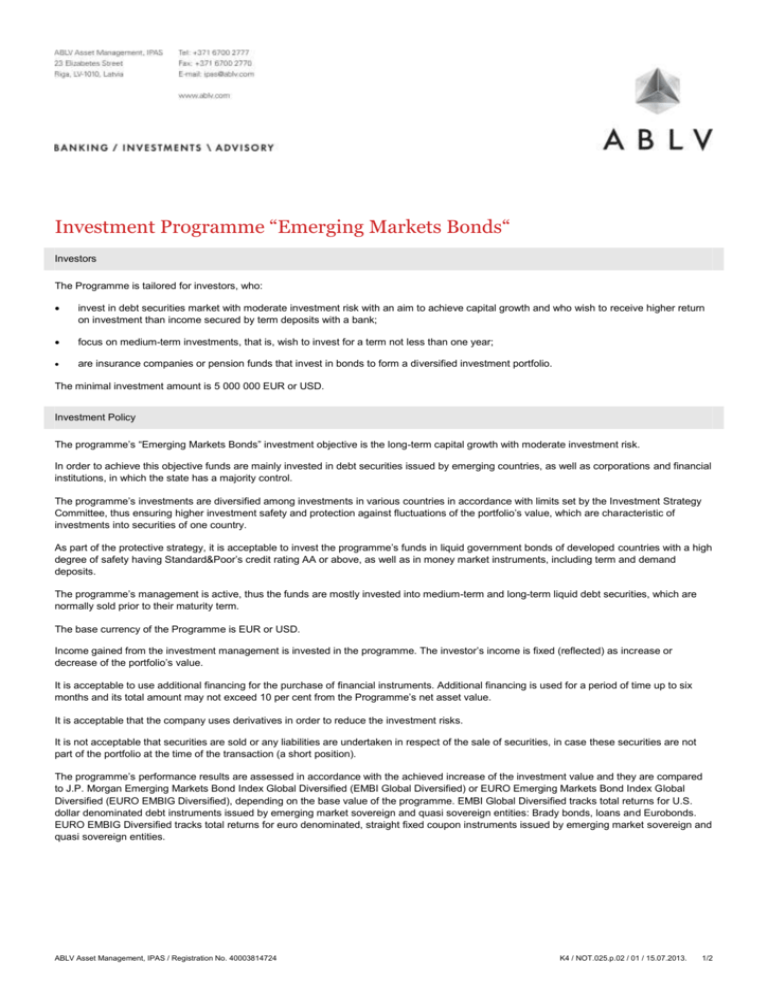
Investment Programme “Emerging Markets Bonds“ Investors The Programme is tailored for investors, who: invest in debt securities market with moderate investment risk with an aim to achieve capital growth and who wish to receive higher return on investment than income secured by term deposits with a bank; focus on medium-term investments, that is, wish to invest for a term not less than one year; are insurance companies or pension funds that invest in bonds to form a diversified investment portfolio. The minimal investment amount is 5 000 000 EUR or USD. Investment Policy The programme’s “Emerging Markets Bonds” investment objective is the long-term capital growth with moderate investment risk. In order to achieve this objective funds are mainly invested in debt securities issued by emerging countries, as well as corporations and financial institutions, in which the state has a majority control. The programme’s investments are diversified among investments in various countries in accordance with limits set by the Investment Strategy Committee, thus ensuring higher investment safety and protection against fluctuations of the portfolio’s value, which are characteristic of investments into securities of one country. As part of the protective strategy, it is acceptable to invest the programme’s funds in liquid government bonds of developed countries with a high degree of safety having Standard&Poor’s credit rating AA or above, as well as in money market instruments, including term and demand deposits. The programme’s management is active, thus the funds are mostly invested into medium-term and long-term liquid debt securities, which are normally sold prior to their maturity term. The base currency of the Programme is EUR or USD. Income gained from the investment management is invested in the programme. The investor’s income is fixed (reflected) as increase or decrease of the portfolio’s value. It is acceptable to use additional financing for the purchase of financial instruments. Additional financing is used for a period of time up to six months and its total amount may not exceed 10 per cent from the Programme’s net asset value. It is acceptable that the company uses derivatives in order to reduce the investment risks. It is not acceptable that securities are sold or any liabilities are undertaken in respect of the sale of securities, in case these securities are not part of the portfolio at the time of the transaction (a short position). The programme’s performance results are assessed in accordance with the achieved increase of the investment value and they are compared to J.P. Morgan Emerging Markets Bond Index Global Diversified (EMBI Global Diversified) or EURO Emerging Markets Bond Index Global Diversified (EURO EMBIG Diversified), depending on the base value of the programme. EMBI Global Diversified tracks total returns for U.S. dollar denominated debt instruments issued by emerging market sovereign and quasi sovereign entities: Brady bonds, loans and Eurobonds. EURO EMBIG Diversified tracks total returns for euro denominated, straight fixed coupon instruments issued by emerging market sovereign and quasi sovereign entities. ABLV Asset Management, IPAS / Registration No. 40003814724 K4 / NOT.025.p.02 / 01 / 15.07.2013. 1/2 Investment Programme “Emerging Markets Bonds“ Risks In accordance with the Programme’s investment policy, funds are mainly invested in debt securities of emerging countries with various credit ratings or without a credit rating, thus the investment programme is subjected to the following risks: Investments in emerging market countries are related to an increasing political risk. Changes in political situations and tax legislation, restrictions of currency exchange and taxes, limitations for activities of foreign investors, restrictions for investment of funds and income repatriation etc. may influence the Programme’s investment results. Investments are related to an increased default risk in case the information about the issuer’s actual situation turns out to be untrue or such information becomes unavailable. The value of debt securities fluctuates depending on changes in interest rates on the market, regardless the safety of debt securities. In addition, there is no information about the interest rate for the reinvestment of the programme’s assets. Thus, the portfolio’s value is subject to interest rate risk. The investments are performed in the base value. Therefore, there is no currency risk. The main risks in respect of the programme’s investments are interest rate risk, information and political risks. Other risks are limited. The programme’s investment strategy is developed in a way to minimise risks as much as possible, however, the manager does not guarantee that it is likely to avoid these risks in the future. Financial Instruments Investment objects are selected in accordance with the programme’s investment policy by observing the principles of diversification and risk reduction. The manager constantly analyses the existing political and economic situation, performs a comparative and technical analysis, as well as summarised analysis of recommendations on various financial markets carried out by the world’s leading brokerage firms and analytical companies. The financial instruments used: Debt securities of Argentina, Belize, Brazil, Bulgaria, the Czech Republic, Chile, China, Columbia, Cote d’Ivoire, Croatia, Dominican Republic, Ecuador, Egypt, El Salvador, Gabon, Georgia, Ghana, Hungary, Indonesia, Iraq, Jamaica, Kazakhstan, Latvia, Lebanon, Lithuania, Malaysia, Mexico, Morocco, Nigeria, Pakistan, Panama, Peru, Philippines, Poland, Romania, Russia, Serbia, Slovakia, South Africa, Sri Lanka, Tunisia, Turkey, Ukraine, Uruguay, Venezuela and Vietnam. Debt securities of corporations and financial institutions of the above-mentioned countries, in which the state has a majority control. Derivatives for investment risks reduction. Money market instruments, including term and demand deposits. It is also acceptable to use other debt securities, not mentioned herein, provided that investment in those instruments is not more than 10 per cent of the programme’s funds. ABLV Asset Management, IPAS / Registration No. 40003814724 K4 / NOT.025.p.02 / 01 / 15.07.2013. 2/2

